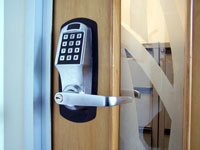|
Written by Christy Eull
|
|
Tuesday, August 23, 2016 03:00 AM |
|
 Regardless of the size of your business, security is vital to business success. You wouldn’t forget to lock your landscape equipment after hours, but what about your computer equipment? Digital security is just as important as keeping your physical tools secure—especially if you keep customer information on file. Whether it’s simply a name, address and phone number or a credit card number for recurring payments, your reputation is at risk if the security of your data is at risk. Regardless of the size of your business, security is vital to business success. You wouldn’t forget to lock your landscape equipment after hours, but what about your computer equipment? Digital security is just as important as keeping your physical tools secure—especially if you keep customer information on file. Whether it’s simply a name, address and phone number or a credit card number for recurring payments, your reputation is at risk if the security of your data is at risk.
There are simple steps you can take to keep your digital assets safe. One of the best ways to protect yourself is widely known but rarely managed properly—passwords. They should be in use and they should be secure. A few tips on where and how to use passwords:
- Wi-fi network – if your business has a wireless network, be sure it is password-protected. It should be used by staff only; don’t make the password available to the public.
- Use a strong password – Are you still using poor passwords like 12345 or password? Your child’s name or your dog’s name are not good passwords, either. Use a combination of numbers, capital letters, lowercase letters, and, if possible, special characters (@#$%).
- Use different passwords—Do not use the same password in more than one place. Yes, it can be cumbersome to memorize so many passwords. But when the security of your business is at stake, a little memorization can be a worthwhile effort. There are also password managers, which store and keep secure all of your many passwords if memorization is too much to manage.
- Change your password often – Be sure that you and your employees change your passwords regularly. Quarterly is a good rule to go by. Again, you’ll need to update your password manager or memorize a new one.
- Lock your computer – Each time you walk away from your computer, lock your screen. Use a password to protect anyone else from seeing your work. Allowing physical access to a computer can be just as dangerous as hacking into your system.
- Remember the small screen – Your smartphone is a computer, too; treat it as such. Follow all of the same security precautions on your phone as you do for your laptop or desktop. Use a screen lock—at the very least, it might keep your children from changing your ringtone to the latest Drake single.
- Train employees to be secure – Just as you make your employees follow safety precautions to prevent physical injury, make sure your staff understand how important it is to keep digital assets safe as well. If an employee uses a tablet or computer for work, make sure they are using all of the same safety measures you use.
Further reading: The FCC has a variety of resources for small businesses that can help you keep your digital assets more secure.
Read more in this issue of Colorado Green NOW:
Internships pay off for students and employer
ALCC members climb the Inc. 5000
Golf tournament is fun for a good cause
Before you recruit, understand your employee needs
|


 Regardless of the size of your business, security is vital to business success. You wouldn’t forget to lock your landscape equipment after hours, but what about your computer equipment? Digital security is just as important as keeping your physical tools secure—especially if you keep customer information on file. Whether it’s simply a name, address and phone number or a credit card number for recurring payments, your reputation is at risk if the security of your data is at risk.
Regardless of the size of your business, security is vital to business success. You wouldn’t forget to lock your landscape equipment after hours, but what about your computer equipment? Digital security is just as important as keeping your physical tools secure—especially if you keep customer information on file. Whether it’s simply a name, address and phone number or a credit card number for recurring payments, your reputation is at risk if the security of your data is at risk.